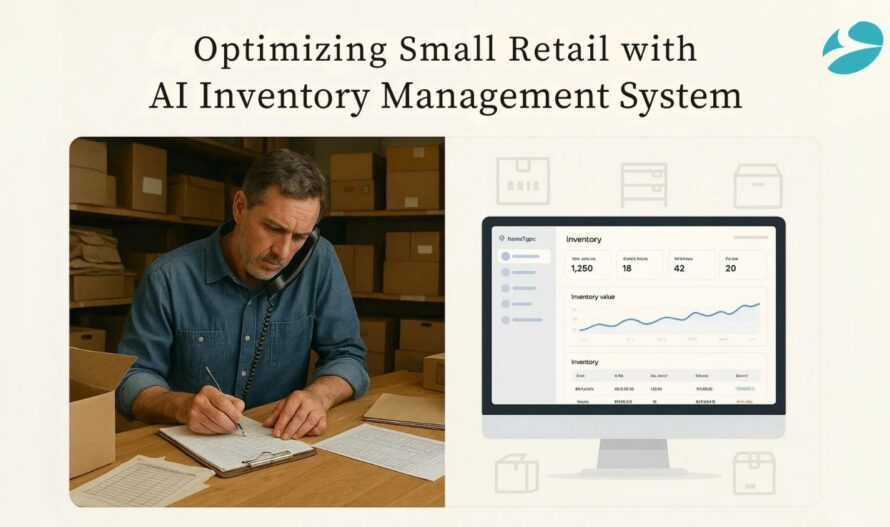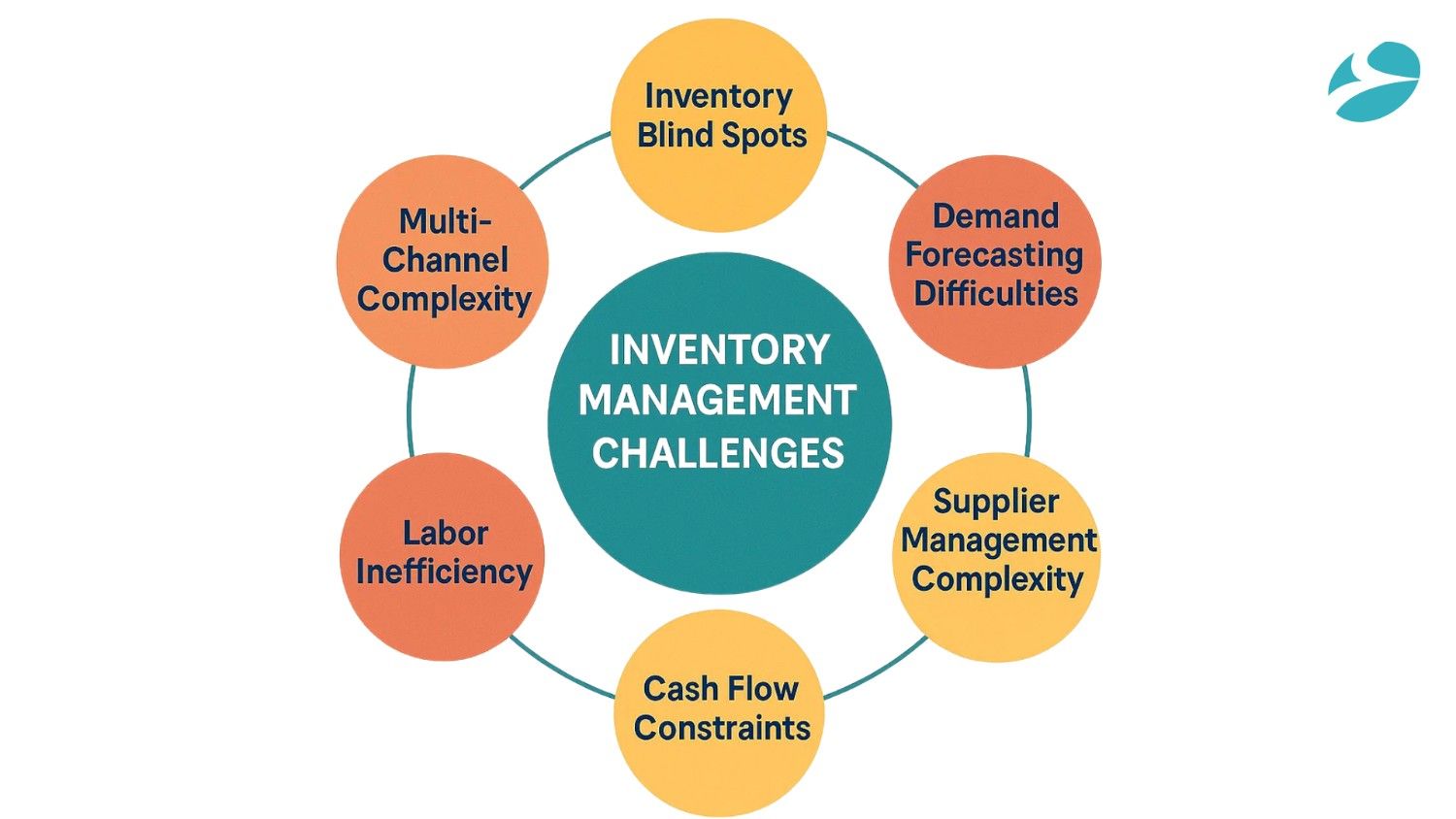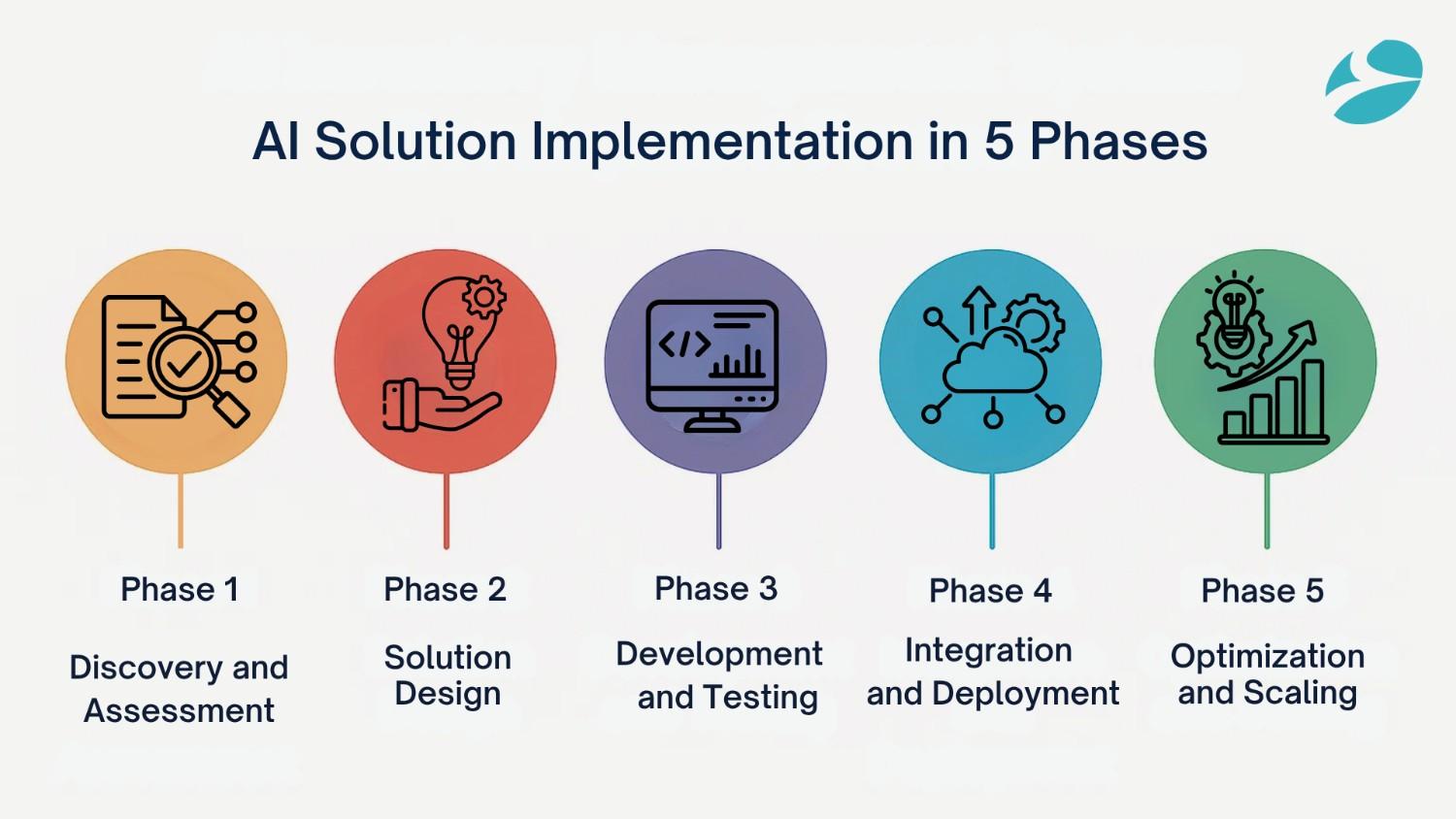Optimizing Small Retail with an AI Inventory Management System
5 min read
5 min read

Small retail business owners often struggle to manage their inventories effectively with traditional management systems. Lack of real-time visibility doesn’t allow for tracking of which items are selling out and which are financial burdens.
They find it challenging to match the customer demands and yet cannot explain the overflowing storage rooms. This reflects negatively on customer experience and the business owner’s bank statements. Improper inventory management is not a standalone problem; it also affects the interconnected processes. Which is, well, everything, from product investments to profit.
Retailers often complain that fluctuations in consumer demand make it difficult to make proper decisions. They often ask, “How can I predict what customers will demand? There’s always something missing and something expiring. Is there any way to streamline my inventory management system?”
At BiztechCS, the answer to that question is yes! An AI Development Company can easily automate and streamline everything. Its real-time updates, demand forecasting, sales pattern analysis, and other advanced functionalities can make this happen.
A retail store generally faces the following challenges with a manual inventory management system. The root cause behind all of them is that manual processes require time, are prone to error, and leave none to few opportunities for mistake rectification.
If not addressed promptly, these challenges can turn into serious errors and have a negative impact on the business:

Most small retailers lack real-time visibility into stock levels. Manual counting consumes valuable hours each week. Human error creeps into every count. The gap between recorded and actual inventory widens.
Products go missing without explanation. Shrinkage from theft or damage remains undetected. Stock-outs occur despite assuming items are available. Customer satisfaction decreases when commodities stay unavailable for an extended period.
Seasonal trends shift unpredictably in today’s market. Last year’s sales data provides incomplete guidance. External factors influence buying patterns constantly. Weather changes, social media trends, and economic shifts all impact demand.
Traditional forecasting methods rely on historical averages and trends. They miss emerging patterns. Overstocking ties up working capital unnecessarily. Understocking means lost sales and disappointed customers.
Managing multiple suppliers requires a significant amount of time and energy when done manually. Each vendor operates on different terms. Lead times vary significantly. Minimum order quantities force uncomfortable choices, and negotiating chances diminish due to inconsistency.
Reorders are processed based on short-term customer demands, rather than long-term business plans, which ultimately adds to the financial burden. This also affects the supplier relationship due to miscommunication.
Excess inventory locks away usable capital. Money sits on shelves instead of driving growth. Seasonal products risk becoming obsolete quickly. Clearing old stock becomes the primary hindrance when making new investments, making it another financial mistake.
Limited capital restricts purchasing power at critical moments. Opportunities for bulk discounts slip away. Competition with better-funded rivals intensifies. Financial stress builds with inventory imbalances.
Instead of attending to the clients, staff spend hours counting, recording, and managing inventory. Yet, it doesn’t yield much profit, which demotivates them. Employee satisfaction drops with minimal results and hours of tedious work.
Hiring staff also becomes a daunting task due to the complex system and the lack of proper information dissemination. The lack of an automated system makes the employee hiring and training process a burdensome task on top of an already excessive workload.
In case the retail store uses multiple sales channels, manual inventory management becomes a nightmare. Mismatched stock level further damages the store’s reputation. At times, the store runs out of a particular product, but it still shows as available on online portals, which is another problem.
Managing inventory across locations multiplies complexity. Transfer requests between stores lack coordination. Data silos prevent unified visibility. The customer suffers from fragmented operations.
A question that often comes up in this situation is, “Do retailers, especially small-scale ones, do they need to integrate AI solutions for their businesses? Is it a must?”
Well, technically? No. But to run a small retail business with limited capital flexibility, smart inventory management software is the solution to all questions. It systematizes the process, creates a sophisticated system, fosters transparency, and frees up time with automation.
Although it is not a necessity at present, an AI-based inventory management system will likely become a requirement in the future.
If these operational roadblocks sound like your daily challenges, then it’s time to upgrade your infrastructure with modern technology. Unlock growth, scalability, and business agility with BiztechCS’s custom Generative AI development services for retail.
The impact of AI in retail is substantial; the global AI in retail market is projected to grow from USD 11.83 billion in 2024 to USD 62.64 billion by 2034 (source). This perfectly showcases how small businesses are welcoming this AI-powered shift for their businesses.
Retailers worldwide are not only understanding but also leveraging this intelligent technology to gain a competitive edge. And, if you are wondering why,
Here’s what artificial intelligence can do for your retail business. Its advanced functionalities will enable you to check your inventory in real-time, eliminating confusion regarding product availability (or lack thereof).
Next, AI-powered management software will be able to provide a thorough report on demand forecasts based on past sales, existing stock, and current trends. This will minimize risks, and you will be able to make better-informed decisions.
Integrating an AI inventory management system would free up staff and lead to improved cash flow. It will also handle multiple sales channels by auto-updating inventory stocks. Investing in the system will enhance customer experience, employee satisfaction, and prepare the business for long-term success.
A smart inventory management software leverages multiple AI technologies simultaneously. Integration happens behind user-friendly interfaces, and complexity remains hidden from daily operations.
Here are some of the commonly used AI technologies in retail:
These systems learn from every transaction. Pattern recognition improves continuously with the accumulation of data. Anomaly detection identifies issues before they escalate. Accuracy increases as the system matures.
Demand forecasting reaches new precision levels. Multiple variables combine in sophisticated models. Future trends become visible weeks in advance. Decisions are made with confidence and not just assumptions.
Camera systems automatically monitor shelf stock. Image recognition counts products without human intervention. Planogram compliance gets verified in real-time. Theft detection operates continuously across the store.
Customer reviews reveal demand signals. Social media sentiment analysis predicts trends. Voice-activated queries simplify system interaction. Communication with suppliers is automated through intelligent parsing and data extraction.
Deep learning identifies complex patterns. Sales correlations emerge from seemingly unrelated factors. Optimization recommendations improve over time. Decision support reaches near-human intuition levels.
Generative AI Development Services for Retail create dynamic reports. Natural language summaries explain complex data. Scenario planning generates multiple strategic options.
Project Management Tip: Long-term success requires scalability, and cloud-native architecture provides it. Small retailers often struggle with rapid scaling, as their solutions are unable to keep pace with business growth. Combine AI functionalities with cloud architecture. This will get you a scalable solution that utilizes extensive security protocols without incurring expensive hardware investments.
As the leading AI development company for retail businesses, we follow a well-defined working methodology that captures every pain point and converts it into an advanced AI-powered business opportunity.
This is how we deliver quality solutions with minimal disruptions when collaborating with a retail business.

The journey begins with a comprehensive operational analysis. Our team members thoroughly study existing workflows. Pain points receive careful documentation. Current data quality undergoes a detailed evaluation.
We conduct stakeholder interviews to understand the unspoken challenges unique to the business. Then, the staff perspective provides ground-level insights. We map out our technology infrastructure by thoroughly understanding the requirements and addressing them effectively.
This is the stage where technical capabilities are aligned to match business requirements. ROI expectations are put upfront, and the project timeline is defined. This enables us to design a robust AI solution within the specified budget and timeframe.
Custom architecture emerges from assessment findings. BiztechCS designs systems tailored to meet specific retail needs. Scalability is built into every layer, ensuring adherence to industry best practices.
We select proven technologies to develop a robust inventory management solution, powered by the Cloud, to ensure optimal flexibility and security. You can also ask for features or UI/UX customization at this stage. Whether you need mobile accessibility or dashboard customization, our team can make it all possible.
Agile methodology drives the development process. Sprint cycles deliver visible progress regularly. BiztechCS maintains transparent communication throughout. Adjustments happen based on ongoing feedback.
GenAI-based intelligent systems are installed and tested in multiple environments, ranging from complex to straightforward. Our team identifies the gaps and corrects them before final deployment. Thorough testing and refining are done to ensure optimal performance after deployment.
Data migration strategies protect historical information. Parallel systems operate during transition periods, and validation checkpoints ensure the accuracy is maintained. Rollback procedures stay ready if needed.
AI solution integration follows careful sequencing. Critical operations receive priority attention to prevent any performance issues post-deployment. BiztechCS continually monitors performance metrics to determine whether the solution requires additional enhancements.
Staff training combines hands-on practice with documentation and record-keeping. Role-based instruction maximizes relevance. Support materials include video tutorials. Quick reference guides simplify daily operations.
The features are added gradually to avoid confusion, and a simultaneous issue resolution practice is employed. The initial weeks witness intense monitoring for quick query and problem resolution. Our team ensures that proper documentation is maintained throughout the process for future reference.
Post-launch optimization never truly ends. We analyze usage patterns continuously. AI models undergo regular refinement to minimize the risk of hallucinations. Performance improvements roll out automatically.
This ensures scalability and secure processes powered by artificial intelligence. New features get introduced based on evolving needs. AI in E-Commerce inventory planning capabilities expand naturally. Additional locations integrate smoothly, and the system grows with business ambitions.
Want to grow your ecommerce business with AI? Connect with BiztechCS and let us redefine growth and scalability with modern integrations.
Still wondering whether to invest in an AI inventory management system? Well, to answer that, here are some key metrics that define our expertise and business success with AI.
Algorithms consider dozens of variables simultaneously. Seasonal patterns combine with trend analysis. Local events factor into forecasting models. This improves the demand forecasting by 30-40% on average.
Stock levels optimize automatically for anticipated demand. Safety stock reduces without risking stock-outs. Working capital allocation becomes more efficient. Waste from overordering virtually disappears.
Every product location becomes instantly visible. Stock counts are updated with each transaction. Multi-location businesses gain unified visibility, and discrepancies trigger immediate investigation protocols.
Project Manager Tip: Implement inventory accuracy audits with a baseline accuracy percentage before AI implementation. Weekly mini-audits should be conducted for high-value items, followed by proper documentation. Doing so will accelerate accuracy improvements within approximately three months.
Reorder points trigger automatically based on predictions. The orders can be generated without human intervention. Lead times factor into timing calculations. Order quantities optimize for cost efficiency.
Staff focus shifts to strategic activities. Rush orders become rare occurrences. Supplier relationships strengthen through consistent patterns. Purchase negotiations happen from positions of knowledge.
Capital allocation optimizes across inventory categories. Slow-moving items get identified proactively. Promotional timing maximizes clearance effectiveness, and investment focuses on high-turnover products.
Financing needs become predictable and manageable. Seasonal planning improves dramatically. Growth funding becomes available for expansion. Profitability increases through better resource allocation.
Product availability meets customer expectations consistently. Search functionality helps locate items quickly. Personalized recommendations increase basket sizes. Omnichannel fulfillment operates seamlessly.
Customer loyalty strengthens through reliable service. Positive reviews replace the negative ones, and competitive advantage grows in local markets. Brand reputation benefits from operational excellence.
Imagine integrating an AI inventory management solution into your business; your morning routine shifts from inventory panic to confident stock knowledge. Staff greet customers instead of counting stock. Orders arrive precisely when needed.
The storage room holds profitable potential, not stagnant capital. Cash flow supports growth initiatives confidently. Customer reviews praise consistent availability.
This future isn’t a hypothetical scenario for forward-thinking retailers. BiztechCS can transform your small retail business’s inventory management. As an AI development company specializing in retail, we translate business inventory chaos into tangible AI-powered solutions.
Today, the question isn’t whether AI will revolutionize small retail. That transformation has already begun. The actual question one should ask: Will my business lead or follow this transformative trend?
Early adopters capture competitive advantages that compound over time, ultimately gaining a significant edge. Data quality improves from the very first day of implementation. Staff develop valuable technical skills, and customer expectations are consistently exceeded.
Smart inventory management represents more than a technological upgrade. It embodies a fundamental business transformation. Efficiency gains multiply across every operation. Strategic capacity expands with reduced tactical burdens.
BiztechCS understands small retail challenges intimately. We design solutions that work for the current business size but scale with it as well.

Artificial Intelligence (AI)
51
By Nandeep Barochiya

Artificial Intelligence (AI)
58
By Uttam Jain

Artificial Intelligence (AI)
375
By Nandeep Barochiya